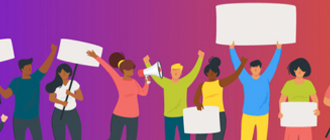
Why Your Small Business Must Invest In Allyship Now
By Net Supatravanij | First published: May 31, 2021 Updated: March 7, 2022
‘Allyship’ may be the workplace initiative you’ve never heard of - but integrating it into workplace culture can help you grow businesses and protect women.
Every workplace is a little bit different. Agreed? Here’s another statement I think most of us would agree on too: gender equality in the workplace and society is something we can all work on to improve. And if you’re a small business, it’s easier than you think to take small steps to improve your workplace culture. This can bring profound positive change for your employees and even your customers.
One of these steps is cultivating workplace allies – or as I prefer to call it: ‘allyship’. But what is allyship? And how can we integrate it into our everyday practices?
I define an ally as someone who is ‘Actively Listening and Looking out for You’. When you spell it out like that, it’s pretty simple – but it can also be quite broad. We can be an ally of anything in theory. So why be an ally for our co-workers or employees?
Prioritizing allyship for business outcomes
Since COVID-19, there’s been an increase in gender inequality both in the workplace and society. This negatively impacts economic recovery from a macro perspective as well as talent retention for small businesses on a micro level. Both have direct consequences to business bottom lines.
It’s been said before but it needs to keep being said: gender equality is not just a women’s issue, it’s a human rights issue. Company leaders need to play a more active role in leaning in with allyship to employees – to both women and men.
The disparities of the pandemic have heightened how unequal the work is for women who have had to manage home schooling, house chores and a day job. In fact, McKinsey notes that “women’s jobs are 1.8 times more vulnerable to this crisis than men’s jobs.”
Building an inclusive organizational culture could help businesses rebound from COVID-19. Deloitte Insights suggests that companies with an inclusive culture are twice as likely to meet or exceed financial targets, six times more likely to be innovative and agile and eight times more likely to achieve better business outcomes.
Which means it’s more important than ever that company leaders prioritize allyship.
Be an ally to your employees
Many countries in Asia still have a stigmatized view of mental health and an overall culture of staying silent, which only adds to the need for creating better support systems. Allyship isn’t about training to become therapists or policemen, it’s about having the right knowledge to react in real time and feel confident in doing so.
It goes without saying that despite an increase of diversity, equity and inclusion policies within companies, cases of harassment and discrimination are still ubiquitous.
According to the EEOC Select Task Force on the Study of Harassment in the Workplace, “90% of employees who experience harassment never file a formal complaint [and] 75% never complain to their employers either.”
As an entrepreneur, workplace mentor or leader, what can you do to offer emotional support to your employees – or help influence attitudes and mindsets? Here are some of the things I’ve learned along the way:
- As the founder of an all-female team, I’ve come to realize the best way to educate is not to isolate or point fingers.
- Actively listen. A lot of the time, people listen only as they’re biding time to respond. Listening without judgement and interruption can be very powerful.
- Discriminating remarks? If all else fails… use humor! Putting someone on the spot – while it may seem well-deserved – is not going to educate them.
I’ll share an example from an investor meeting I once attended. A group of men asked my Head of Finance if she knew what a cap table was. Instead of getting upset or calling them out for ‘mansplaining’, we simply replied that she had undergone four years of financial education from a renowned business university and had worked in finance for the last five years. (Of course she knew what a cap table was!)
Make sure you’re being an ally to your female co-workers
Here’s a shameful statistic: 1 in 3 women worldwide have experienced gender-based violence. But since COVID-19? Those numbers are skyrocketing at alarming rates in what UN Women have dubbed the ‘Shadow Pandemic’.
Isolation and high tension households are ingredients for domestic abuse. Victims often look for escape in public spaces like pharmacies, supermarkets - and their workplace. In Singapore, pharmacies have just announced that they will train retail staff to recognize signs of abuse and direct victims towards help. One initiative I am launching for International Women’s Day 2022 in London is turning local stores into safe spaces. From cocktail bars to gift shops, participating stores will display a Safe Space sticker in the window and staff will be trained to recognize signs of abuse and redirect victims towards help.
Our philosophy at ila, the gender equality enterprise I founded in 2018, is to empower everyone to use their voices. We as employers must look out for one another and the colleagues in our care. As a co-worker you can:
- Actively looking for signs of abuse. This pertains not just to physical signs (a possible bruise) but mental signs as well. Be observant.
- Checking in to see that everything is OK. The next time you’re at the pantry, elevator or printing room and you sense someone may be struggling, approach them in a non-intrusive manner to signal for help if needed.
- It’s important to recognize that your own mental health is crucial to being a good ally. Prioritize self-care.
Stepping up for employees starts with a top-down approach. As a manager or leader you can:
- Build awareness by incorporating diversity and inclusion into cultural pillars and create a dedicated committee to drive initiatives. And don’t keep D & I siloed or sporadic. Build it into every aspect of what you do.
- Train employees to recognize and respond to signs of violence and handle issues with confidentiality.
- Implement a buddy program. This is mentorship on a peer-to-peer level, giving employees a go-to person to rely outside their line manager.
Of course, allyship doesn’t happen overnight. It takes commitment, empathy and intrinsic motivation from both leaders and employees. But the pay-offs - a truly inclusive, fulfilled workforce and a stable workplace culture – will extend outside your office environment. Higher productivity, greater talent retention and positive brand reputation also contribute considerably to how you weather economic storms, grow and achieve.
SHARE THIS STORY
- How To Ship A Giant Panda
- How To Make Freight Shipments Work For Your Small Business
- The Rise Of Intra-Asia Trade: Opportunities In The China-Southeast Asia Corridor
- Southeast Asia's Role In Global Manufacturing Supply Chains
- 8 Most Unusual Shipments In The History Of FedEx
- Where Do Old Planes Go When They Retire?
Sign up now and save on your shipping rates!
Sign up now and earn discounts by shipping instantly with FedEx Ship ManagerTM at fedex.com.
Recommended For You

How To Build Diversity, Equity, & Inclusion At Your Small Business
Starting a small business? Building a diverse, inclusive workplace culture for all employees and genders is just as important as your market strategy.
Read More
Women Of FedEx Challenging Bias For The Better
From frontliners to aviation security and pilots, women at FedEx are making an impact across the organization and challenging gender biases.
Read More
Top 3 Trends For The Future Of Entrepreneurship
Becoming an entrepreneur is now the first choice for young people in Asia, who aspire to found new businesses over traditional employment.
Read More


